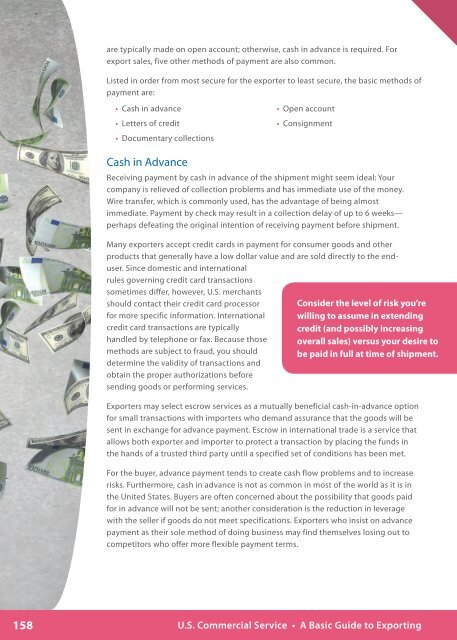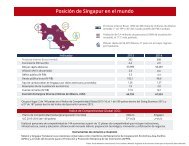basic-guide-to-exporting_Latest_eg_main_086196
basic-guide-to-exporting_Latest_eg_main_086196
basic-guide-to-exporting_Latest_eg_main_086196
You also want an ePaper? Increase the reach of your titles
YUMPU automatically turns print PDFs into web optimized ePapers that Google loves.
are typically made on open account; otherwise, cash in advance is required. Forexport sales, five other methods of payment are also common.Listed in order from most secure for the exporter <strong>to</strong> least secure, the <strong>basic</strong> methods ofpayment are:• Cash in advance• Letters of credit• Documentary collections• Open account• ConsignmentCash in AdvanceReceiving payment by cash in advance of the shipment might seem ideal: Yourcompany is relieved of collection problems and has immediate use of the money.Wire transfer, which is commonly used, has the advantage of being almostimmediate. Payment by check may result in a collection delay of up <strong>to</strong> 6 weeks—perhaps defeating the original intention of receiving payment before shipment.Many exporters accept credit cards in payment for consumer goods and otherproducts that generally have a low dollar value and are sold directly <strong>to</strong> the enduser.Since domestic and internationalrules governing credit card transactionssometimes differ, however, U.S. merchantsshould contact their credit card processorfor more specific information. Internationalcredit card transactions are typicallyhandled by telephone or fax. Because thosemethods are subject <strong>to</strong> fraud, you shoulddetermine the validity of transactions andobtain the proper authorizations beforesending goods or performing services.Consider the level of risk you’rewilling <strong>to</strong> assume in extendingcredit (and possibly increasingoverall sales) versus your desire <strong>to</strong>be paid in full at time of shipment.Exporters may select escrow services as a mutually beneficial cash-in-advance optionfor small transactions with importers who demand assurance that the goods will besent in exchange for advance payment. Escrow in international trade is a service thatallows both exporter and importer <strong>to</strong> protect a transaction by placing the funds inthe hands of a trusted third party until a specified set of conditions has been met.For the buyer, advance payment tends <strong>to</strong> create cash flow problems and <strong>to</strong> increaserisks. Furthermore, cash in advance is not as common in most of the world as it is inthe United States. Buyers are often concerned about the possibility that goods paidfor in advance will not be sent; another consideration is the reduction in leveragewith the seller if goods do not meet specifications. Exporters who insist on advancepayment as their sole method of doing business may find themselves losing out <strong>to</strong>competi<strong>to</strong>rs who offer more flexible payment terms.158U.S. Commercial Service • A Basic Guide <strong>to</strong> Exporting





